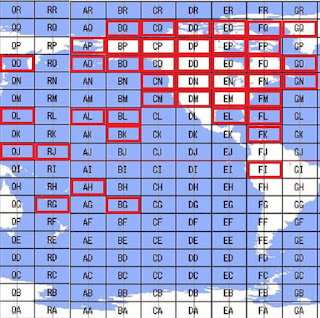Posts Tagged ‘CW’
 Radio Bench Fun!
Radio Bench Fun!

Every once in awhile I’m reminded of the magic of radio and why this hobby is so much fun!
For the past week and a bit, in between power outages of up to four days, I’ve been optimizing a circuit from the December ‘36 ‘Radio’ magazine.
It looked like it might be something that would be fun to use during the weeknight NRN (Novice Rig Nights) activities ... a Jone’s-style push-pull crystal power oscillator using a pair of 6V6s. The original article called for 6L6s but my power supply can probably not provide much more power than is already coming from the 6V6s and these will likely be easier on my few precious novice-band crystals.
The circuit is lashed-up on my very well-worn 'aluminum breadboard', which is peppered with numerous convenient holes punched or drilled for mounting various crystal sockets, tube / coil sockets, variable caps etc ... it really looks awful but allows easy parts swapping to test out different configurations.
This afternoon I had the thing perking to my satisfaction, along with a very sweet-sounding CW note, using my WWII - era 7121kc crystal. Everything looked good into the dummy load so I connected the 40m antenna through the tuner, clipped the bug to the cathode resistor and at about 40 minutes before sunset, sent a short ‘CQ’, hoping for a nearby local but not really expecting a reply ... now this is the magic part.
My CQ was immediately pounced-upon by John, N2BE, on the other side of the continent, in New Jersey! I shook my head at the dangling pile of clip leads and just-barely soldered components clamped in the bench vice and had to smile when he gave me a 589 report! John was working the AWA's Linc Cundall CW Contest, where rigs must be pre-1950 designs or builds. I was happily able to give him a legitimate point, using my 1936 Jones oscillator!
At 400V on the plates, the little lash-up puts out 18 watts and seems to be about 45% efficient ... not too bad for a power oscillator. As well, the crystal current must be low as it keys nicely and doesn't sound stressed.
I’ll soon be rebuilding the little transmitter into something more presentable, probably similar to my Tri-Tet-Ten, using the short-lived but visually attractive mid-30’s building style that mated a shiny aluminum plate to a nice wooden base.
Stay tuned ... I’ll hopefully have it completed over the next few weeks and will be looking for some 80 / 40m NRN Monday night fun!
 Hunting Foxes With QRP
Hunting Foxes With QRP
For those of us that enjoy CW as well as QRP operating, the Winter QRP Fox Hunt nights make for an exciting combination of both interests.
The QRP Fox Hunt is an operating event during which low power (QRP) stations or "Hounds", attempt to make contact with specific QRP stations designated as "The Fox".
Spanning a twenty week period from November to April, each week sees two Fox Hunt events ... one on Tuesday evening and another on Thursday evening. The Tuesday night event sees the Hounds go hunting on 40m, while on Thursdays, the move to 80m, for an even greater challenge.
For each evening, there are two assigned 'Fox stations', usually one in the east and one in the west. The object of the hunt is for the hounds (you and I) to find and work the fox ... both foxes if you can, as bagging both is the ultimate goal. This all sounds pretty easy except for the fact that all foxes and all hounds are limited to 5W output or less, and therein lies the fun! If you have never heard a pileup of QRP stations, it is worth tuning in just to listen ... a multi-station cacophony of QRP signals, all around 559 or weaker ... it's not your typical kilowatt-laden ear crushing pileup!
The 40m foxes will be found between 7030 and 7050, while the ones on 80m will be between 3550 and 3570 kHz. Most foxes make a habit of working split, usually listening 'up 1', so once you find the pileup, the fox is easier to locate.
The hunts begin at 0200Z and run until 0329Z ... early evening here on the west coast and mid-evening out east.
Complete rules and a 'Fox Hunt Primer' may be found on the QRP Fox Hunt home page here. For discussion of the individual events and soapbox comments, join the QFox ioGroup site here or join the chat in Facebook's QFox QRP Foxhunt Group.
If you're in search of some challenging week-night operating fun, you may just find what you are looking for with the bi-weekly QRP Fox Hunts. Working both foxes is not as easy as it might sound and is an excellent test for your antenna system and of your CW operating skills. Come and join the fun this coming Tuesday ... no special hunting permits required!
 Cheap ‘flight deck’
Cheap ‘flight deck’
My LNR Precision MTR5b always comes away with me and for good reason. It’s small, portable and xyl friendly. It does however, suffer from a lot of wires and bits loosely hanging around. Mrs g7kse regularly takes the opportunity to ‘tidy’ stuff up. This means I can no longer find it. This is ok at home because it hasn’t gone far but a pain when I’m not at home.
Ikea has long been a source of cheap stuff and their chopping boards are just the thing to make into a small flight deck. The one I got is approximately 24cm by 15cm and came as a pack of two with a much larger one that is in use in the kitchen.
I thought the first thing to do would be make up a small tray that I can sit the MTR5b into and then still that to the board. Duly designed and 3d printed. Next up was a small notebook like the boys in blue use, after that some magnets for my palm key (it has a magnetic base). Lastly some velcro tape and 4 m4 nuts, bolts and washers. he optional part is a DC buck converter (just be careful to check dimensions as they change shape and size a bit) that I use to regulate the voltage to 12v (I got carried away and made a really bad case for it)
I thought I’d sink the magnets into the board at then epoxy them in. Mainly because its polypropylene and nothing sticks too well to these waxy plastics. All this took was a bit of careful dremelling and you’re done. The notebook is clipped to the board and the velcro strips stuck down onto the back. The ast ting to do was put 6 feet on it so I didn’t scratch any surface I carelessly chucked the thing on. Here’s a few photos and a link to the parts on Thingiverse.




 Here Comes The ’29 QSO Party!
Here Comes The ’29 QSO Party!
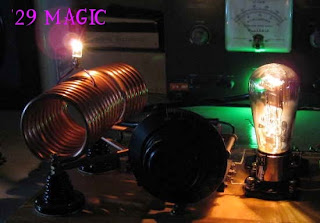 |
| courtesy: Lou, VE3AWA |
This Saturday night as well as the next will be the annual Bruce Kelley 1929 QSO Party, otherwise known as the '1929 BK'.
Only transmitters that are 'era-appropriate' are allowed to be used. More specifically, transmitters must employ tubes that were available in 1929 or earlier, and transmitters must be self-excited. No crystals allowed! Crystals were new and largely unaffordable for most hams back in the depression days.
The year of 1929 marked a real turning point in amateur radio as governments finally cracked-down on things such as frequency stability, out of band operations and re-alignment of call districts. In short, hams were henceforth required to behave themselves and to clean up their signals and methods of operation.
 |
| courtesy: http://www.arrl.org/ |
If you tune across the CW bands during the next two Saturday nights, you will have the rare opportunity to hear exactly what the bands must have sounded like back in the early '30s'.
For the most part you will hear single-tube Hartley, Colpitts or TNT oscillators along with a few two-tube MOPAs thrown in. Many of them will suffer the same problems encountered by the boys of '29 ... chirp, drift, buzzy notes and frequency instability from antennas swaying in the wind.
Again this year, signals should be a little louder as well, since the previous long-time power limitation of 10W input has been increased to 25W.
The MOPAs will sound much better but some surprisingly nice-sounding signals can be heard coming from properly tuned and optimised single-tube oscillators. I recall being blown away by the lovely sounding signal I heard from such a rig when first tuning into the BK activity several years ago, only to learn that it was a self-excited Hartley using 1/4" copper tubing for the oscillator tank circuit!
The '29 watering-hole on 80m will be around 3550-3580 kilocycles (be careful not to confuse this with kilohertz!) while the early afternoon to post-sunset 40m activity will be found from 7100-7125 kc. There may even be a few on the very low end of 160m. Although many of these transmitter styles were used on 20m and higher, BK rule-makers have wisely decided not to inflict these sounds on the present populace as it would likely keep the 'Official Observers' busy for several days writing pink-slips.
This year I will leave the MOPA on the shelf and set up my Hull Hartley as I haven't used it since building the MOPA a few years ago. If it's very windy (almost assured), the Hartley will really sound like 1929!
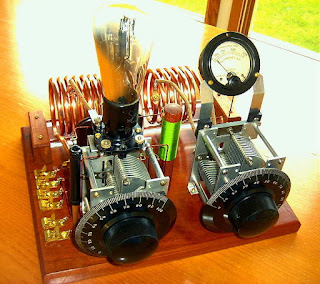 |
| My own Hull Hartley |
You can learn more about amateur radio happenings leading up to and following the 1929 crackdown in my earlier series of 'Why '29' blogs here:
Part 2
Part 3
Part 4
Those wishing to put something together for next year's event can find everything needed here:
Building '29-Style - Part 1
Building '29-Style - Part 2
Let's hope for good conditions for this event as the last few years have been adversely affected by geomagnetic storming. Poor propagation or not, I guarantee there will be plenty of '29ers busy calling 'CQ AWA' on the low bands.
Complete BK details are available here.
 CLE237 Results
CLE237 Results
 Last weekend's CLE237 was truly a workout. Not only was the format challenging, hunting for different grid square fields, but propagation was superb ... a vast departure from the normal CLE propagation-curse!
Last weekend's CLE237 was truly a workout. Not only was the format challenging, hunting for different grid square fields, but propagation was superb ... a vast departure from the normal CLE propagation-curse!All told, 118 NDBs in 41 different grid fields were logged. Of these 118 stations, 12 were 'new catches'. After DXing NDBs since 1985, new catches are getting harder and harder to find but last week's great conditions were the best heard here in several years.
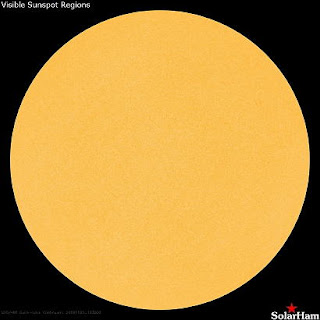 |
| Today's quiet Sun! |
With a very quiet Sun for a couple of weeks now, these great MF conditions are what many have been waiting for since the last solar low many years ago ... propagation below the broadcast band can be truly remarkable when these quiet conditions continue for many weeks at a time.
Here are a few interesting CLE catches as recorded on the Perseus SDR.
NDBs QY (Sydney, Nova Scotia), YBB (Pelly Bay, Nunavut)and 3Z (Russell, Manitoba) all sharing 263kHz within a few Hz of each other.
My full CLE237 log is shown below. As usual, a Perseus SDR and an 'inverted-L' (resonated to 300kHz) was used for the activity.
AH
28 13:30 403 TUT Pago Pago, SMA
AL
28 13:30 400 MDY Midway, MDW
AO
27 12:30 283 DUT Dutch Harbor, ALS
27 12:30 341 ELF Cold Bay, ALS
27 12:30 385 EHM Cape Newenham, ALS
27 12:30 390 HBT Borland, ALS
AP
27 06:00 263 OAY Norton Bay, ALS
27 13:30 275 CZF Cape Romanzof, ALS
27 13:00 325 BVK Buckland, ALS
27 13:30 347 TNC Tin City, ALS
27 13:00 356 HHM Kotzebue, ALS
BG
27 13:30 352 RG Rarotonga, CKS
BK
27 13:30 332 POA Pahoa, HWA
BL
27 14:00 353 LLD Lanai, HWA
BO
27 12:00 277 ACE Kachemak, ALS
27 12:00 355 AUB King Salmon, ALS
27 12:00 394 RWO Kodiak, ALS
27 12:00 411 ILI Iliamna, ALS
27 12:00 429 BTS Dillingham, ALS
BP
27 12:00 212 CGL Juneau, ALS
27 13:00 257 CUN Fairbanks, ALS
27 12:00 346 OLT Soldotna, ALS
27 12:30 347 DJN Delta Junction, ALS
27 12:00 350 VTR McGrath, ALS
BQ
27 13:00 376 PVQ Deadhorse, ALS
CN
27 06:00 378 AP Mayne Island, BC, CAN (MY NEAREST)
27 12:00 266 SLE Salem, OR, USA
27 07:00 356 PND Portland, OR, USA
27 06:00 356 MEF Medford, OR, USA
27 06:00 404 MOG Montegue, CA, USA
CM
27 07:00 203 TCY Tracy, CA, USA
29 04:00 385 MR Pacific Grove, CA, USA
CO
27 12:00 266 ICK Annette Island, ALS
27 12:00 414 IME Sitka, ALS
27 12:00 529 SQM Sumner Strait, ALS
CP
27 13:30 222 WY Wrigley, NT, CAN
27 08:00 380 YUB Tuktoyaktuk, NT, CAN
27 12:00 392 ZFN Tulita, NT, CAN
CQ
29 06:00 321 YSY Sachs Harbour, NT, CAN
DM
27 08:30 242 EL El Paso, TX, USA
27 10:00 278 CEP Ruidoso, NM, USA
27 13:00 341 OIN Oberlin, KS, USA
DN
27 09:00 233 BR Brandon, MB, CAN
27 09:00 275 HIN Chadron, NE, USA
27 09:00 383 CNP Chappell, NE, USA
27 09:00 400 FN Fort Collins, CO, USA
27 09:00 414 GRN Gordon, NE, USA
DP
27 08:00 207 PY Fort Chipewyan, AB, CAN
27 08:00 212 BY Beechy, SK, CAN
27 08:00 219 ZRS Regina, SK, CAN
27 08:00 221 QU Grande Prairie, AB, CAN
27 08:00 230 VG Vermilion, AB, CAN
DQ
27 08:30 361 HI Holman, NT, CAN
EL
27 06:00 260 MTH Marathon, FL, USA
27 10:00 269 AR New Iberia, LA, USA
27 10:00 329 HMA Hondo, TX, USA
27 06:00 332 FIS Key West, FL, USA
27 07:00 332 IC Wichita, KS, USA
27 07:00 335 BV Batesville, AR, USA
27 07:00 338 UMP Indianapolis, IN, USA
27 07:00 349 GW Greenwood, MS, USA
EN
27 12:00 257 JYR York, NE, USA
27 06:00 329 PMV Plattsmouth, NE, USA
27 06:00 360 SW Warroad, MN, USA
27 08:00 368 VIQ Neillsville, WI, USA
27 09:00 368 PNM Princeton, MN, USA
EO
27 07:00 212 YGX Gillam, MB, CAN
27 08:00 216 YFA Fort Albany, ON, CAN
27 08:00 218 RL Red Lake, ON, CAN
27 08:00 224 MO Moosonee, ON, CAN
27 08:00 258 ZSJ Sandy Lake, ON, CAN
EP
27 06:00 224 BK Baker Lake, NU, CAN
27 09:00 241 YGT Igloolik, NU, CAN
27 08:00 263 YBB Kugaaruk, NU, CAN
27 10:00 329 YEK Arviat, NU, CAN
27 10:00 335 YUT Repulse Bay, NU, CAN
EQ
27 04:00 365 YGZ Grise Fiord, NU, CAN
FI
27 05:00 365 PAL Palma, EQA
FK
28 05:00 369 ZDX Saint Johns, ATG
27 06:00 391 DDP Vega Baja, PTR
27 05:00 415 CBC Cayman Brac, CYM
FM
29 05:00 198 DIW Dixon, NC, USA
FN
27 08:00 289 YLQ La Tuque, QC, CAN
27 05:00 407 ZHU Montreal, QC, CAN
27 07:00 516 YWA Petawawa, ON, CAN
FO
27 10:00 208 YSK Sanikiluaq, NU, CAN
27 18:37 323 KR Schefferville, QC, CAN
27 10:00 351 YKQ Waskaganish, QC, CAN
27 10:00 390 VP Kuujjuaq, QC, CAN
27 08:00 396 YPH Inukjuak, QC, CAN
FP
27 09:00 277 YLC Kimmirut, NU, CAN
27 10:00 338 YPX Puvirnituq, QC, CAN
28 10:00 358 YKG Kangiqsujuaq, QC, CAN
FQ
29 07:00 256 YCY Clyde River, NU, CAN
GN
27 10:00 263 QY Sydney, NS, CAN
27 08:00 280 QX Gander, NL, CAN
27 08:00 350 DF Deer Lake, NL, CAN
GO
28 08:00 220 BX Lourdes de Blanc, QC, CAN
28 08:30 281 CA Cartwright, NL, CAN
28 10:00 396 JC Rigolet, NL, CAN
GQ
28 06:00 399 UP Upernavik, GRL
QJ
27 12:00 366 PNI Pohnpei Island, FSM
QL
27 13:00 343 ML Minami Tori Shima, MTS
27 12:00 360 OX Iwo Jima, VOI
QO
28 13:30 437 OG Okha, RSE
RG
27 12:30 260 NF Norfolk Island, NFK
RJ
27 12:00 316 MAJ Majuro Atoll, MHL
27 12:00 393 UKS Kosrae, FSM
As always, complete CLE results (worldwide) can be viewed in detail here.
All-in-all, an exhausting but delightful weekend of listening and great propagation ... so many signals to hear ... welcome to solar-low!
 Monday’s ‘NRN’ CW Fun
Monday’s ‘NRN’ CW Fun
 |
| My homebrew Ameco AC-1 clone |
A weekly CW operating activity that seems to be growing in popularity is the Monday “NRN”.
The NRN get-togethers are an offshoot of the annual “NRR” or Novice Rig Roundup. Monday’s “Novice Rig Night” gradually grew from those that wanted to see the NRR fun continue, in one form or another, without waiting an entire year for the event to roll around again.
Operating times run from sunup on the east coast to midnight on the west coast ... but basically, people just get on the air whenever they can on Monday and call “CQ NRN”. I suspect that most of the activity takes place between late afternoon and bedtime, with 40m probably seeing the most action. As winter arrives, we may see more activity on 80m but these are only my personal observations from the west coast.
Most folks are using typical Novice-era transmitters and / or receivers, with the Drake 2NT, early Heathkits, Eicos, homebrews and Hammarlunds being popular. The previous Monday I was active with my homebrew Ameco AC-1 clone, a 6V6 crystal power oscillator, at about 6 watts out. Good contacts were had with several eastern stations. There are several AC-1s around and there has been at least one suggestion of an 'AC-1 Night' ... what fun that would be as well!
For last night’s NRN, I brought out my homebrew Paraset.
Once again, good contacts were had with the easterners on 40m: W9BRD in NJ, W3NP in WV, KD2E in NJ and VE3LYX using his No.19 tank radio ... two WWII radios talking to each other in 2018, one real and one a reproduction!
 |
| VE3LYX's No.19 set operating position |
Here is the formal announcement for the Monday events, with a few additional details. Hopefully you can join the fun (any rig is fair game!), next week.
 Hunting For NDBs in CLE 236
Hunting For NDBs in CLE 236
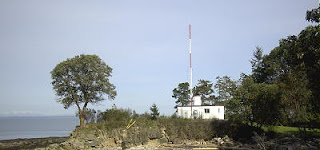 |
| AP-378 Mayne Island, BC |
How time flies. Once again it's a CLE weekend. It seems like the last one was just a week ago!
'CLE's are 'Co-ordinated Listening Events, and NDB DXers around the world focus their listening time on one small slice of the NDB spectrum.
This time the hunting ground is the 15 kHz slice from 370.0 - 384.9 kHz.
This is a somewhat dreaded range for me since my local blowtorch NDB, 'AP' (378 kHz), sits right in the middle of the range. 'AP' is located at the entrance to Active Pass, the main ferry route to Vancouver Island, and the antenna is about 3/4 of a mile down the beach from me. Needless to say, the beacon is about 40db over S9! With careful loop nulling, I can reduce this by about 25db but it's still an enormous signal to deal with.
Hopefully you can put 'AP' in your own log this weekend but its 25-watt signal will be much weaker for you. It's been logged as far east as Illinois and with your receiver in the CW mode, can be found on 378.399 kHz.
All too often our CLE weekends get hammered by geomagnetic disturbances, possibly because our monthly schedule syncs up nicely with the Sun's rotation and the disturbance from the previous month once again rotates into position. Conditions this time surely can't be much worse than for our previous event and today's mid-week check looks promising.
 |
| courtesy: NOAA |
 |
| courtesy: NOAA |
Things seem geomagnetically quiet at the moment so lets hope they stay that way. LF and MF propagation can often be amazing in the fall and as summer storms start to dissipate, the band can become much less noisy.
From CLE coordinator Brian Keyte (G3SIA), comes the following CLE info:
Hi all,
Please join us in our 236th coordinated Listening Event which starts
this Friday and celebrates the arrival of the Equinox this weekend.
CLEs are not contests - if you enjoy taking part you will be a winner!
Days: Friday 21 September - Monday 24 September
Times: Start and end at midday, LOCAL TIME at the receiver
Range: 370 - 384.9 kHz
Just log all the NDBs that you can identify with their nominal (listed)
frequencies in the range (it includes 370 kHz, but not 385 kHz)
plus any UNIDs that you come across there.
Please send your CLE log to the List in a plain text email if possible
(not in an attachment) with CLE236 and FINAL at the start of its title.
Show on each log line:
# The date (e.g. 2018-09-21, etc., or just 21) and UTC
(the date changes at 00:00 UTC)
# kHz (the nominal published frequency, if known)
# The Call Ident.
Show those main items FIRST - other optional details such as Location
and Distance go LATER in the same line.
If you send interim logs, please also send a 'FINAL' (complete) log.
As always, tell us your own location and brief details of the equipment
that you were using during the weekend.
Joachim or I will send the usual 'Any More Logs?' email at about 17:00
UTC on Tuesday - you can then check that your log has been found OK.
All logs must arrive on the list at the very latest by 08:00 UTC on
Wednesday 26th September. We hope to complete making the combined
results within a day or two.
To help you to plan your listening, seeklists and maps for your part of the
World are available via the CLE page http://www.ndblist.info/cle.htm
Good listening - enjoy the CLE.
Brian
------------------------------------------------------------------
From: Brian Keyte G3SIA ndbcle'at'gmail.com
Location: Surrey, SE England (CLE coordinator)
------------------------------------------------------------------
If you are interested in some remote listening - maybe due to local difficulties - you could use any one remote receiver for your loggings, stating its location and with the owner’s permission if required. A remote listener may NOT also use another receiver, local or remote, to make further loggings for the same CLE.
-------------------------------------------------------------------
- determine, worldwide, which beacons are actually in service and on-the-air so the online database can be kept up-to-date
- determine, worldwide, which beacons are out-of-service or have gone silent since the last CLE covering this range
- will indicate the state of propagation conditions at the various participant locations
- will give you an indication of how well your LF/MF receiving system is working
- give participants a fun yet challenging activity to keep their listening skills honed
The Yahoo ndblist Group has been moved to Groups.io and The NDB List Group will now be found there! The very active group is a great place to learn more about the 'Art of NDB DXing' or to meet other listeners in your region. There is a lot of good information available there and new members are always very welcome. As well, you can follow the results of other CLE participants from night to night as propagation is always an active topic of discussion.
You need not be an NDB List member to participate in the CLEs and all reports, no matter how small, are of much value to the organizers.
Remember - 'First-time' logs are always VERY welcome!
Reports may be sent to the NDB List Group or e-mailed to CLE co-ordinator, Brian Keyte (G3SIA), whose address appears above. If you are a member of the group, all final results will also be e-mailed and posted there.
Please ... give the CLE a try ... then let us know what NDB's can be heard from your location! Your report can then be added to the worldwide database to help keep it up-to-date.
Have fun and good hunting!






